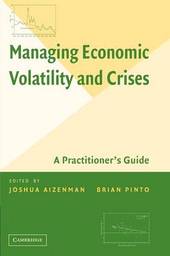
|
Managing Economic Volatility and Crises: A Practitioner's Guide
Paperback / softback
Main Details
| Title |
Managing Economic Volatility and Crises: A Practitioner's Guide
|
| Authors and Contributors |
Edited by Joshua Aizenman
|
|
Edited by Brian Pinto
|
| Physical Properties |
| Format:Paperback / softback | | Pages:614 | | Dimensions(mm): Height 229,Width 152 |
|
| Category/Genre | Macroeconomics
Microeconomics |
|---|
| ISBN/Barcode |
9780521168595
|
| Classifications | Dewey:338.542 |
|---|
| Audience | | Professional & Vocational | |
|---|
| Illustrations |
Worked examples or Exercises
|
|
Publishing Details |
| Publisher |
Cambridge University Press
|
| Imprint |
Cambridge University Press
|
| Publication Date |
14 April 2011 |
| Publication Country |
United Kingdom
|
Description
Economic volatility has come into its own after being treated for decades as a secondary phenomenon in the business cycle literature. This evolution has been driven by the recognition that non-linearities, long buried by the economist's penchant for linearity, magnify the negative effects of volatility on long-run growth and inequality, especially in poor countries. This collection organizes empirical and policy results for economists and development policy practitioners into four parts: basic features, including the impact of volatility on growth and poverty; commodity price volatility; the financial sector's dual role as an absorber and amplifier of shocks; and the management and prevention of macroeconomic crises. The latter section includes a cross-country study, case studies on Argentina and Russia, and lessons from the debt default episodes of the 1980s and 1990s.
Author Biography
Joshua Aizenman is Professor of Economics at the University of California, Santa Cruz. Prior to his appointment at UCSC, he was Champion Professor of International Economics at Dartmouth College. Professor Aizenman's other affiliations have included teaching and research positions at the University of Pennsylvania, the University of Chicago Graduate School of Business, and the Hebrew University in Jerusalem. He has held consultancies with the International Monetary Fund, the World Bank, the Inter-American Development Bank, and the Federal Reserve Bank of San Francisco. His research covers a range of issues in open economy including commercial and financial policies, crises in emerging markets, foreign direct investment, capital controls, and exchange rate regimes. Professor Aizenman also serves as a Research Associate for the National Bureau of Economic Research. Brian Pinto is Lead Economist in the Economic Policy Department, Poverty Reduction and Economic Management Network, at the World Bank, Washington, DC, where he has worked for more than 20 years. He has had diverse assignments, including in Treasury operations, the International Finance Corporation, the Europe and Central Asia Region, and various central departments. Dr Pinto lived and worked in Poland at the start of its momentous reforms (1990-92) and Russia just before its 1998 crisis and subsequent recovery (1998-2001). His areas of expertise include analytical and practical country-based experience in macroeconomic crises and recovery, public debt sustainability analysis and transition economics. His publications have appeared in numerous professional journals.
|